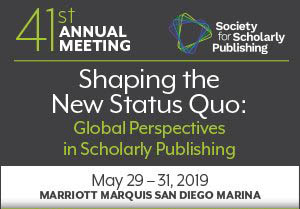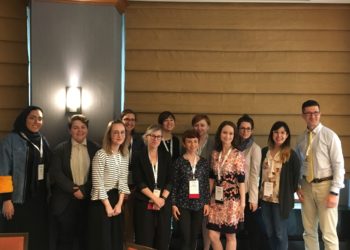Next week is the Society for Scholarly Publishing (SSP) Annual Meeting in San Diego. While many of us consider the SSP Annual Meeting the perfect place to catch up with industry friends and colleagues, we can’t ignore the excellent programming. The meeting runs Wednesday to Friday and is packed with pre-conferences, keynotes, product demonstrations, and 36 sessions! With so many options to chose from, we thought it would be fun to see which sessions the Chefs are planning to attend (or watch on social media). You can see the entire meeting program on the SSP website.
So this month we asked the Chefs: Which SSP Annual Meeting session are you most looking forward to and why?

Rick Anderson: The whole program this year looks wonderful, but the session I’m most looking forward to is titled, “Want to Know How Researchers Feel about Scholarly Publishing? Let’s Ask Them!”.
For several years now I’ve felt a sense of mounting alarm, as it has seemed to me that the emerging landscape of scholarly communication is being shaped without the participation or even the regular input of those who create the content that is the lifeblood of the body scholarly. I very much look forward to hearing the perspectives of this panel of researchers and research administrators on some fundamental (and fundamentally important) scholarly communication topics of the day.
The emerging landscape of scholarly communication is being shaped without the participation or even the regular input of those who create the content that is the lifeblood of the body scholarly.
David Smith: (Leveraging Open Source Technology to Enable Real Change in Scholarly Communications/Moving Beyond Current Technology Silos) I am fascinated by the various efforts to reimagine the technical infrastructure of Scholarly Communication. The problem space of information dissemination, storage, validation, replication, accreditation, curation, re-use, and transformation is a huge one and for it to be solved, the plumbing has to be sorted. The plumbing also has to scale, and by scale, I mean it has to be adopted – by participants on both the supply and demand sides.
I look to the great cloud providers (AWS and Azure, forget the rest) and I see how they leverage open source tech into paid-for services. I observe how the ‘stack’ is vertically differentiated to enable users to tap in to the tech supply at whatever level is appropriate for them. And I wonder what a scholarly technology stack might look like, and whether the participants in this session will form part of that.
Lettie Conrad: With SSP in my home state of California this year, I’m over the moon excited for this annual meeting. I’m especially looking forward to session 5B: “Change It Up! Switching Departments, Changing Career Focus, Taking Risks — From Those Who Have Done It!” Knowing several of the brilliant and driven speakers on this panel, I look forward to learning from their chameleon experiences in adapting to diverse publishing sectors and new positions. I know a few who have written their own job descriptions, some more than once!
The topic seems especially timely in today’s “gig” economy, with new outlets for learning, networking, and experimenting. I can attest: There is much potential for personal growth and professional advancement in risky career switches. For those over-achievers in the room, my read-ahead suggestion would be Bec Evans and her wisdom about the “Happy Hustle,” who advocates for following our curiosities and stretching our comfort zones. Would love to hear your experiences, too — come find me at “Change It Up!” that Friday at 11:15am PT.
Tackling imbalances in scholarly communication, between and within countries, is not easy but hearing from engaging speakers is vital for understanding different perspectives.
Sian Harris: Unfortunately I can’t be at the SSP meeting in person this year but there are definitely plenty of sessions that I will be following on Twitter. Top of my list is the keynote talk from Dr. Mariamawit Yeshak of Addis Ababa University. She will be speaking about the disconnect between the rate of publication and impact on societal development in Africa, focusing on potential solutions for maximizing societal benefit from publishing and how publishers can help.
This is a vital conversation to be having and something INASP (who I work for) has been exploring recently in a range of dialogue events on the topic of research equity, including one in late 2018 with the Ethiopian Academy of Sciences in which Dr Yeshak participated. Tackling imbalances in scholarly communication, between and within countries, is not easy but hearing from engaging speakers is vital for understanding different perspectives. I hope that ‘Want to Know How Researchers Feel About Scholarly Publishing? Let’s Ask Them!’ will also bring some valuable researcher perspectives.
I’m encouraged that the whole SSP program picks up on many of the issues of diversity and inclusion that we have been considering in the Kitchen over the past couple of years. I will be interested to follow the talk by Betsy Beaumon of Benetech about using technology to ensure accessibility for everyone and the session that Alison Mudditt is leading on tackling harassment in the workplace.
It looks like a great conference. Please do lots of tweeting for those of us who won’t be there!
Angela Cochran: Building a Brand on “Concrete Research” — How Smaller Publishers Maximize Their Niche. I spend a lot of time talking about the plight of small, independent (often society owned) publishers. We live in interesting times. The negative attention on “Big Deal”-wielding publishers presents us with an opportunity to share with librarians and our communities what we have to offer. At the same time, the emergence of large Read and Publish or Publish and Read deals are mostly not accessible to smaller publishers.
There is another dynamic at play and that is the massive amount of literature (of varying quality) available from traditional and not-so-traditional players. A smaller publisher can get swallowed up. This session promises to focus on how to capitalize on your niche, which I think is the way for smaller publishers to move forward. I am interested to hear what the panelists have to say on the topic and expect to learn about society partnerships and community building around niche audiences.
I would also like to explore the challenges of having too many niche audiences within your stable. Balancing the needs of disparate groups can quickly become unsustainable if the goal is to make every niche community feel like a unique and special constituency.
Robert Harington: The annual SSP meeting is upon us. This will be a good meeting, judging by the excellent program, and yes of course there will be the wonderful San Diego weather.
There is an intriguing session early on in the meeting entitled “Independent Publisher Planning for Plan S: The Findings of a Multi-Publisher Workshop” (Session 1C). This is a topic that has soaked up significant bandwidth for many of us. How does an independent society publisher begin to consider how Plan S will affect the publishing of journals and books, when Plan S is a force even if not yet reality?
For a society like mine, the American Mathematical Society, we are fairly sure that the future looks positive in its diversity. We see a mixed economy of subscriptions and openness, electronic and print. In the end my job is to serve the mission of our society, recognizing that society publishing revenues allow us to fulfill our mission. The promise of this session is in its scale. A recent HighWire meeting gathered around 40 people from 20 organizations to discuss these issues, reaching into specifics about what Plan S compliance may look like. I would love to know what options were discussed and favored, and I will take copious notes. Needless to say, the speakers are top notch, including Rich Dodenhoff for the American Society for Pharmacology and Experimental Therapeutics, Susan King from Rockefeller University Press, Karen Halm from the American Journal of Neuroradiology, Dana Compton from the American Society of Civil Engineers, and of course John Sack from HighWire. See you there…
How does an independent society publisher begin to consider how Plan S will affect the publishing of journals and books, when Plan S is a force even if not yet reality?
Jasmine Wallace: Research and development in accessibility brings benefits to everyone, and it is an important step towards inclusion and reducing barriers in scholarly communication. Largely, accessibility is about eliminating obstacles and making something more open and adaptable; and if woven into the design of their content, accessibility can increase the reach publishers have in the global marketplace. However, accessibility is also something that publishers are slow to adapt into their workflows, content development and strategic plans. I am looking forward to attending the session on “Digital Equality: The Importance of Accessibility in Your Publishing Strategy”. It appears that this session will provide publishers with clear and concise guidance to assist them in incorporating accessibility at the start of their content creation. In addition, the diverse panel of speakers will likely offer a variety of differing perspectives on ways to approach similar issues.
The overview of this session on digital equality highlights several important considerations, such as the need for accessibility based on legal and ethical regulations, answering questions about Section 508 laws and WCAG compliance for national accessibility requirements, but plans to address how accessibility has the ability to drive social change as well. There is also an emphasis not only on making pre-existing content more accessible, but the need to create content that is born accessible. It will be interesting to see how the panelist approach this topic. The panelists will also give practical tips on building accessibility into publishing workflows. As publishers continue expanding into the global arena they must work towards making content more open and accessible to the broadest variety of readers. Overall, I believe this session will give useful contributions to the larger conversation of how accessibility is best achieved.
Alice Meadows: Choosing just one of anything is always a problem for me — especially in this case, when there are so many excellent sessions on the program. But in fact it didn’t take me long to know that I wanted to pick our first keynote speaker, Dr Mariamawit Yeshak. Conferences in our community, like many (most? all?) others, have for many years featured mostly (or entirely) male keynotes. The analysis that Lauren Kane and I did of seven major scholarly communications conferences in 2015 showed that men outnumbered women nearly two to one that year (11 men to six women in a pool of 17). We didn’t look at other forms of diversity — ethnicity, geography, age, etc — but I’d put money on that group being mostly if not all white, middle-aged or older, and from the global north.
So it’s been fantastic to see the shift in just a few years since then, with SSP playing a leading role — for example, remember Safiya Noble’s inspirational opening keynote last year? This year (with a little help from our friends at INASP) the annual meeting committee has done it again. Dr. Yeshak is a young woman of color from the global south, and a professor of pharmacognosy at Addis Ababa University. (Yes, I had to Google it; for those of you who, like me, don’t already know, it’s the study of medicinal drugs obtained from natural sources, like plants — something I’m very interested to learn more about as I personally benefited directly from this when undergoing treatment for breast cancer.) In our global north bubble, Dr. Yeshak is a great example of a voice we rarely hear from talking about a topic to which we don’t pay enough attention. She is perfectly placed to help us better understand how scholarly communications work in Africa where, although more and more researchers are publishing in high impact journals, the impact of this research on their own communities is lagging, as well as to inspire us, as scholarly communications professionals, to help maximize the benefits of publishing for societal impact — in Africa and beyond. I can’t wait, and I hope you can’t either! (PS yes, there will be tweeting 🙂
APCs have not solved the problem of participation, especially – though not only — for the Global South. Add the high transactional burden of APCs for all stakeholders, and I fail to see how APCs alone can support the future of fully open research that we’re striving for.
Alison Mudditt: I’ve had growing concerns about a headlong rush towards article processing charges (APCs) as the model for open access for a number of years now, and those have only intensified over the past year or so with the push towards RAP (Read and Publish) and PAR (Publish and Read) deals. APCs have played a critical role in establishing open access as both a sustainable business model and a viable publishing route for top quality research. But as I’ve said before, while the goal of creating a more equitable system has been partially reached by opening access to the literature, APCs have not solved the problem of participation, especially – though not only — for the Global South. Add the high transactional burden of APCs for all stakeholders, and I fail to see how APCs alone can support the future of fully open research that we’re striving for.
To date, much of the business model innovation has been around the edges and so I’m really interested to hear more about Annual Reviews’ new “subscribe to open” program in session 4C: “Subscription and Open Access: Can They Play Well Together?” We’re exploring some similar ideas at PLOS (only in our case, we’re looking at ways to flip an APC model to an “open subscription”) and have had very positive responses from libraries and consortia so far. As we’ve been reminded here in the Kitchen many times, the subscription model does have a number of benefits, top among them being distribution of costs across a larger number of entities, thereby reducing the price paid by in individual terms.
If we think of open access (or fully open research) as the outcome we’re driving towards rather than a business model per se, then there’s no reason why a subscription model can’t be harnessed as at least part of the solution. An open subscription model also has the potential to solve much of the high administrative burden of APCs by leveraging the existing infrastructure. Above all, I’m anxious that we don’t get locked into a one-size-fits-all model for our open future and excited to learn how we can leverage others’ experience to date.
Michael Clarke: I am looking forward to ““I Didn’t Know That Was Possible:” Cutting Edge Technologies and Techniques to Challenge Cultural Norms” because there are 3 interesting speakers and the description promises a balance between a future vision and practical technologies that can be used right now. I also like the nod to culture, as technology is only part of any solution.
Todd Carpenter: As someone who attends many, many events throughout the year, the one meeting that stands out for me the most is SSP. It’s always more like a reunion and gathering of friends than work, although a lot of work does get done, perhaps more so this year than in other years. I’m looking forward to the session “Achieving Standards Nirvana: Why Industry Interoperability Isn’t Easy, but Is Worth the Effort” (Session 4E at 4:45pm on Thursday afternoon). Don’t think, “Of course, Todd would pick the standards session” nor should you dismiss this session as only for geeks. Technology exchange and interoperability is a critical element of the work that each publisher does and standards makes those interchanges possible.
Led by NISO’s Associate Director, Nettie Lagace, with the involvement of the expert perspectives of Lettie Conrad, Heather Staines, Julie Zhu, and Jason Price, the session promises to be lively and informative. There will be a discussion of how standards are applied and will include involving audience volunteers in role-playing conversations that illustrate the different perspectives and input that are required to make standards work across the community. The session will use several standards projects: KBART, Open Discovery Initiative, and Transfer as examples, to help audience members to come away with a better sense of process, how shared and conflicting interests are brought together in standards creation, and ultimately, reasons to support standards and industry recommendations.
Another session, that unfortunately I won’t be able to participate in, but I would like to recommend to you all is the pre-conference session, the Charleston Trendspotting Initiative, on Wednesday morning. If you can squeeze it in, I expect the session to be a terrific discussion. I participated in the Trendspotting meeting two years ago at the Charleston Conference and it was a terrific conversation. Led by Heather Staines and Lisa Janicke Hinchliffe, I’m sure the conversation will be wide-ranging and enlightening. I’m looking forward to hearing the outcomes of the meetings.
Of course, there will be the final roundtable conversation with the Chefs, which will be incredible, I’m sure! Enjoy the meeting everyone.
Technology exchange and interoperability is a critical element of the work that each publisher does and standards makes those interchanges possible.
Judy Luther: SSP provides a wealth of opportunities to connect with others who expand our views, address industry issues from multiple perspectives and challenge us to think creatively. Friday morning’s session (5A) on “The Great Divide: Communicating Scholarly Research to Practitioners”, a panel about extending academic research to practice, is a prime example. Angela Cochran, Journals Director at the American Society of Civil Engineers, and two faculty Amy Rechenmacher at University of Southern California and Ingrid Tomac at University of California San Diego will share steps they have taken towards integrating practitioners in their own work. The two moderators, Rebecca Springer and Danielle Cooper from Ithaka S&R will present findings from their research on current concerns and practices of scholars.
Making research open does not ensure that the larger audience of those who could make use of it will know about it. The research literature is structured and written for consumption by other researchers who are motivated to subscribe or to search for it. Articles are designed to identify the specific objectives, the methodology, the data and the results. What is missing is context and implications. Increasingly publishers are creating various methods – bullets, summaries, visual abstracts – to communicate why and how the research matters. This is a time of experimentation and different approaches may work better for different disciplines. So, it is useful to hear about what is working in a specific discipline as we learn from each other.
Attending sessions provides the opportunity for Q&A discussions and subsequent connections not only with the speakers but those in the audience who raise interesting points. While there are many sessions addressing key issues, this one speaks to a topic of key importance to me — increasing the value of research for society.
_______________________________
Now it’s your turn! Which SSP Annual Meeting session are YOU most looking forward to and why?
Hope to see you there – or on social media!



